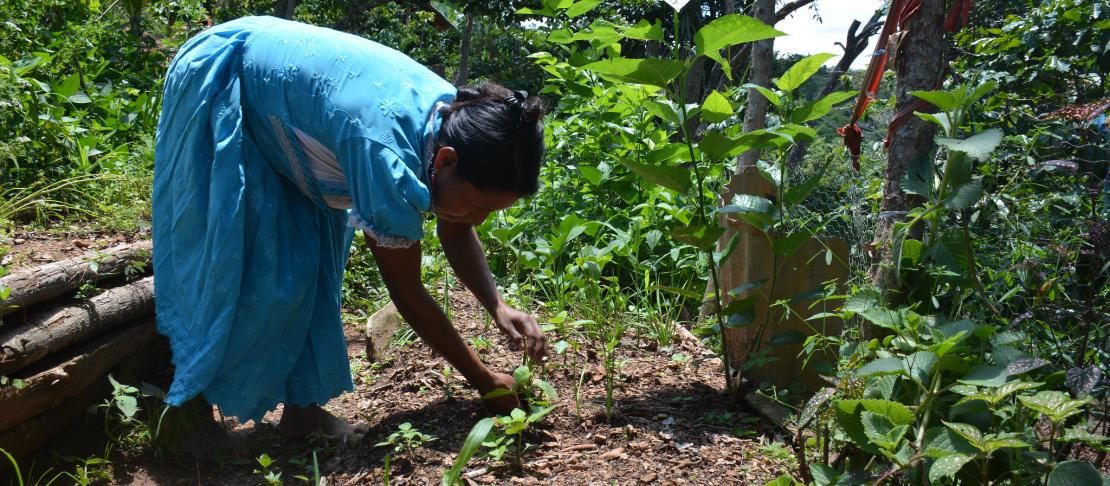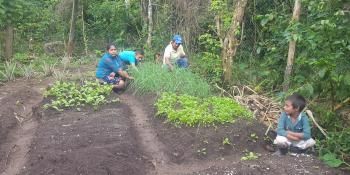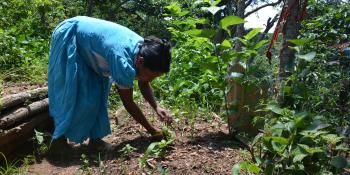Olopa Climate-Smart Village, Guatemala

Project description
The Climate-Smart Village (CSV) approach is based on the principles of participatory research to generate evidence on climate-smart agriculture (CSA). The research carried out in a CSV is by default based on the specificities of the context and its enabling characteristics for the implementation and scaling of CSA. A CSV constitutes living laboratories that show how different actors in a territory co- develop, test, adopt and evaluate portfolios of integrated and innovative CSA options aiming to reach sustainable agriculture and improvement of livelihoods of the rural population.
The municipality of Olopa belongs to the department of Chiquimula in eastern Guatemala. Olopa is one of the largest producers of coffee in eastern Guatemala and that is the main source of income for its farmers. Producing basic grains, such as white corn and beans is the second most important activity with which farmers seek to guarantee food security for their families. Livestock is the third main source of income, focusing on predominantly artisanal poultry production systems, which are also the main source of animal protein that these communities have.
70% of the rural households that rely on agriculture as the main source of livelihood have plots of less than 1 ha, and almost 80% of these households have difficulties with supplying enough food during the year. 62 communities were identified in the municipality, of which seven were randomly selected to be included in the baseline study to implement the CSV: Tituque Abajo-Tishmuntique, El Palmar-Guayabal, Prensa Arriba, Tuticopote Abajo, El Bendito, Nochan, Rodeo Valle Nuevo, and El Guayabo Tercer Caserío.

Activities
- Field Schools.
- Implementation of the tool of Participatory Integrated Climate Services for Agriculture (PICSA).
- Implementation of low-cost weather stations to track weather and climate behavior.
- Access to the information generated in the Local Technical Agroclimatic Committee of Chiquimula.
- Prioritization and implementation of CSA practices, mainly water harvesting for irrigation, fish production, and home gardens.
Expected outcomes
In general terms, all CSVs must achieve the following results:
- CSA options specific to the territory, including transformative options, in addition to systems models of integrated crops, livestock and trees to increase resilience. These would be tested and evaluated on the farm, and examined by gender implications and scaling potential.
- A better understanding of the perceptions of farmers and key actors along the value chain of CSA options, and evaluation of the conditions for the success or failure of interventions.
- Simulation of CSA options under different climates and socio-economic scenarios for informed decision-making.
- A better understanding of the institutional options that would allow CSA scaling.
- A scientific approach from the farmer to adapt CSA in the local context and allow its scaling.
- Empirical and big data analyzes on climate management that generate climate sensitive extension schemes and climate advisory systems for farmers.

Gender and youth
CCAFS research project “Generating evidence on gender-sensitive climate-smart agriculture to inform policy in Nicaragua and Guatemala” has been working in Olopa CSV through monitoring local communities to conduct an in-depth analysis on the strengthening of CSA capabilities with a gender perspective.
The project has also worked with local producers from the CSV and organizations to strengthen their capacities with a gender perspective. In that sense, was achieved the construction of the “Step by step for the inclusion of gender in climate-smart agriculture initiatives for Guatemala” guide, a step by step that will allow Guatemalan institutions working in agriculture and climate change to include a gender perspective in their interventions.
Similarly, in the monitoring carried out by the project, it was possible to learn about the trends of adoption of CSA options by men and women in Olopa CSV. Among the most relevant monitoring findings are:
- The women of Olopa CSV reported less frequency compared to men in having received income for their agricultural work.
- Women who did report having invested in the farm, more often declared that the investment was directed to recover or prevent the negative effects of climatic events.
- In the Olopa CSV, 10% of men and 15% of women also stated that they had done farming as a climate risk mitigation action.
Partners
- Ch'orti Regional Farmers Association (ASORECH)
More information
- Info Note: Avanzando hacia un Territorio Sostenible Adaptado al Clima: oportunidades y desafíos para escalar iniciativas de adaptación en el Corredor Seco de Guatemala (Only available in Spanish)
- Info Note: Examining gender differences in the access to and implementation of climate-smart agricultural practices in Central America
- Manual: Paso a paso para la inclusión de género en iniciativas de agricultura sostenible adaptada al clima para Guatemala (Only available in Spanish)
- Working paper: Co-diseñar un sistema de monitoreo y alerta temprana de hambre estacional relacionado a variabilidad climática en Guatemala (Only available in Spanish)
- Journal article: Emergency drills for agricultural drought response: a case study in Guatemala
For more information, please contact project leader Jesús David Martínez, CCAFS Latin America (jdmartinez@cgiar.org) and Deissy Martínez Barón, CCAFS Latin America (dmbaron@cgiar.org).
Funding
The work of the CGIAR Research Program on Climate Change, Agriculture and Food Security (CCAFS) in the Climate-Smart Villages, is carried out with the support of the donors of the CGIAR Fund and through bilateral financing agreements. For details, please see item https://ccafs.cgiar.org/es/ donors.

